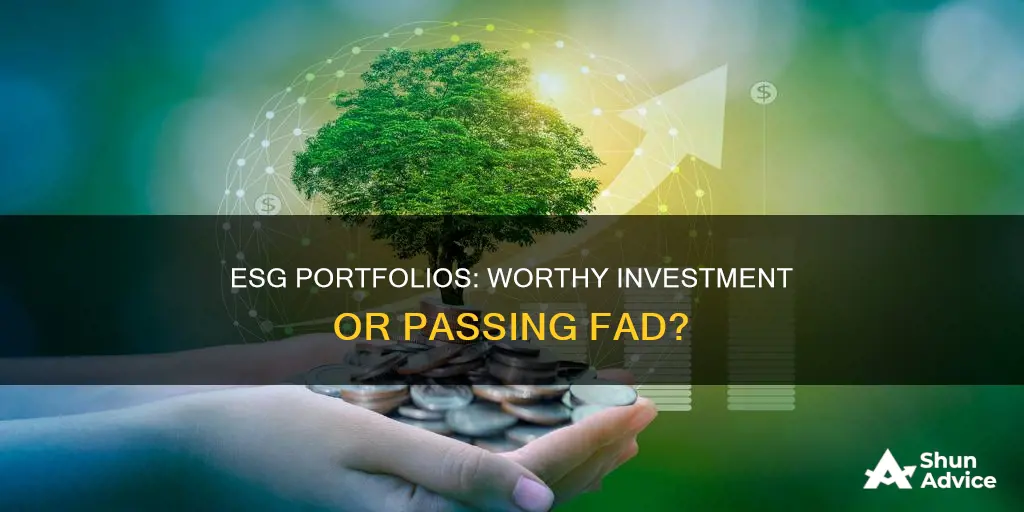
Environmental, social, and governance (ESG) investing is a way to build a more ethical portfolio. ESG funds consider environmental, social, and governance issues and are used to evaluate a company or investment's sustainability. ESG investing is a form of sustainable investing that considers environmental, social, and governance factors to judge an investment's financial returns and its overall impact.
ESG investing is a strategy to ferret out companies that meet specific environmental, social, and good governance parameters. ESG investors hope that by investing in sustainable companies, capital will flow into companies that meet the ESG standards and thus further a healthier planet and more compassionate corporate society.
ESG portfolios consider risks like water scarcity and climate issues, offering long-term resilience. According to a 2021 Morgan Stanley report, ESG investments consistently outperformed their traditional counterparts between 2004 and 2020.
| Characteristics | Values |
|---|---|
| Environmental | Climate change policies, greenhouse gas emissions, carbon footprint, water usage, renewable energy usage, recycling practices, employee incentives promoting carpooling, relationships with the U.S. Environmental Protection Agency |
| Social | Employee treatment and compensation, employee engagement and turnover, employee training and development, employee safety policies, diversity and inclusion in hiring, ethical supply chain sourcing, customer service performance, consumer protection activity, lobbying efforts, public stance on social justice issues |
| Governance | Executive compensation, policies that define and enforce ethical business practices, diversity of the board and management team, shareholders' ability to nominate board candidates, transparency of shareholder communications, history of shareholder lawsuits, relationships with the U.S. Securities and Exchange Commission |
What You'll Learn

ESG funds vs individual stocks
ESG funds and individual stocks are both ways to invest in companies that meet specific environmental, social, and governance criteria. However, there are some key differences between the two approaches.
ESG funds are a collection of multiple stocks grouped together, whereas individual stocks are just that – individual stocks in a particular company. One of the main advantages of ESG funds is that they can decrease risk due to the diversification of holding shares in many companies rather than just one. Additionally, ESG funds are often aligned with specific missions, such as clean water, renewable energy, or women in leadership, allowing investors to support particular causes that are important to them.
On the other hand, investing in individual stocks may be preferable for those who want more control over the specific companies they invest in and their overall portfolio composition. Individual stocks can also be a good option for those who want to invest in a particular industry or asset class that may not be well-represented in ESG funds. When considering individual stocks, it is important to look beyond ESG scores and also evaluate traditional investment selection strategies, such as fundamental analysis for stock picking or expense ratios and performance metrics for fund selection.
Both ESG funds and individual stocks offer a way to incorporate ESG criteria into an investment portfolio. The decision between the two ultimately depends on the investor's goals, experience, and tax situation, as well as their level of comfort with active versus passive fund management strategies.
Adjusting Your Child's Future: Editing 529 Investment Portfolio
You may want to see also

ESG criteria
The ESG criteria are a set of standards used to evaluate a company's sustainability and social responsibility. ESG stands for Environmental, Social, and Governance factors. These criteria are used by investors to make more ethical investment decisions and by companies themselves to evaluate their sustainability.
The environmental criteria look at how a company affects the natural world and include factors such as:
- Climate change policies
- Greenhouse gas emissions
- Carbon footprint
- Water usage and conservation
- Renewable energy usage
- Recycling practices
The social criteria examine how a company treats people, both inside and outside the company, and include factors such as:
- Employee treatment and compensation
- Employee engagement and turnover
- Employee safety policies
- Diversity and inclusion in hiring and promotions
- Ethical supply chain sourcing
- Customer service performance
The governance criteria consider how a company is run and include factors such as:
- Executive compensation
- Business ethics
- Board diversity
- Shareholder rights
- Transparency of shareholder communications
Building a Portfolio: Investing Strategies for Beginners
You may want to see also

ESG investing benefits
ESG investing has several benefits for investors. Firstly, it offers the potential for high returns. Some studies have found that ESG investments can outperform conventional ones, delivering equal or superior investment returns compared to traditional investing approaches.
Secondly, ESG investing enables investors to align their investments with their personal values and ethical beliefs. This means investors can support companies that demonstrate policies congruent with improving the environment, promoting positive social justice, and advancing sound governance.
Thirdly, ESG investing can lead to a more just and sustainable world. By investing in companies with strong ESG practices, investors can encourage and support sustainable business practices that have a positive impact on society and the environment.
Additionally, ESG investing can reduce portfolio risk. Companies with strong ESG practices tend to have better operational performance and are less likely to face business disruptions, resulting in more reliable financial results and lower downside risk for shareholders.
Lastly, ESG investing may indicate strong leadership and long-term focus within a company. The implementation of ESG initiatives requires exemplary leadership, and companies with a long-term outlook tend to perform better over time.
Age-Based Investment Strategies: Building a Strong Portfolio Mix
You may want to see also

ESG investing risks
ESG stands for environmental, social, and (corporate) governance. While ESG investing is a great way to build a more ethical portfolio, there are some risks to consider.
Firstly, there is a lack of universal ESG standards, which can create inconsistencies in ESG portfolios and funds. For example, some ESG funds may hold tobacco stocks, which goes against the core values of ESG investing. This risk is heightened by the fact that there is no long-term data on the financial performance of ESG companies. If longer-term data were to show that ESG companies are not as resilient as previously thought, investors who are focused on financial returns may shift away from the ESG sector.
Another risk to consider is that companies may stop reporting on ESG issues. If companies were to stop voluntarily reporting sustainability data, the supply of high-quality, investable ESG companies would decrease. This could be due to a broad deprioritisation of ESG attributes or a failure to see the direct link between ESG and long-term financial performance.
Furthermore, there is a widespread lack of knowledge and understanding of ESG investment analyses. Due diligence and compliance processes may suffer from a lack of efficiency due to limited internal understanding of ESG-related investment issues.
Finally, there is a risk that ESG investing may not actually make a difference or have a positive impact. A recent Harvard Business Review article examined the ESG records of 147 US companies and found that the companies in the ESG portfolios had worse compliance records for labour and environmental metrics. This study also determined that adding companies to ESG portfolios did not improve their labour or environmental compliance.
Roth Accounts: Savings or Investment?
You may want to see also

ESG portfolio construction
ESG, or environmental, social, and governance investing, is a way to build a more ethical portfolio. ESG criteria evaluate a company's sustainability, considering its impact on the natural world, how it treats people, and how the company is run.
- Understand the Basics: ESG investing is a strategy to identify companies that meet specific environmental, social, and governance parameters. The environmental category focuses on a company's carbon footprint, climate impact, and natural resource conservation efforts. The social category examines employee wellbeing, company health and safety, diversity, and community impact. The governance category looks at business ethics, board diversity, and accounting practices.
- Choose an Investment Platform: Open an online brokerage account with a platform that offers robust ESG investment options and screening tools. Review features, available assets, and costs. Evaluate the ESG criteria and screening capabilities of the platform. Decide between a taxable or retirement account.
- Fund Your Account: Provide your personal and financial information, including name, address, phone number, Social Security number, date of birth, driver's license, employment status, and financial details. Link a bank account to your brokerage account and transfer funds.
- Determine Your ESG Criteria: Decide on the specific ESG factors that are most important to you and your investment goals. This could include environmental initiatives, social justice issues, or governance practices. Determine the minimum ESG score you are willing to accept for potential investments.
- Research ESG Investments: You can take a self-directed approach by using the screening tools on your brokerage platform to identify ESG investments that meet your criteria. Alternatively, consider using a robo-advisor, which is a low-fee digital investment manager that offers ESG portfolios based on your goals and risk tolerance.
- Select ESG Investments: Choose the specific ESG stocks, bonds, or funds that align with your criteria and values. Diversify your portfolio by investing in a range of assets and industries.
- Place Trades: Once you have selected your ESG investments, place trades on your brokerage platform by entering the investment's ticker symbol, choosing a dollar amount or number of shares, and selecting the order type (market or limit). Monitor your trades on the Orders page of the platform.
- Monitor and Adjust: Regularly review the performance of your ESG portfolio and consider making adjustments as needed. Stay updated on the latest ESG trends and research to inform your investment decisions.
- Consider the Risks: Keep in mind the potential risks of ESG investing. There is a lack of universal ESG standards, and the long-term financial performance of ESG companies is still uncertain. Additionally, companies may stop voluntarily reporting ESG data, reducing the number of high-quality ESG investment options.
By following these steps, you can construct an ESG portfolio that aligns with your values and financial goals while promoting sustainable and ethical business practices.
Invest to Grow: Why Smart Investors Shun Savings Accounts
You may want to see also
Frequently asked questions
ESG stands for environmental, social, and (corporate) governance. ESG investing is a form of socially responsible investing that prioritises financial returns and emphasises a company's effects on the environment, its stakeholders, and the planet.
ESG investing has the potential for high returns. A 2019 white paper by the Morgan Stanley Institute for Sustainable Investing found that from 2004 to 2018, the total returns of sustainable mutual and exchange-traded funds were similar to those of traditional funds. Other studies have found that ESG investments can outperform conventional ones. ESG investing also allows investors to invest in accordance with their personal values.
To start investing in ESG, you'll need to choose an investment platform, typically an online brokerage account. After opening and funding the account, you can use the platform's research section to screen for ESG investments that fit your criteria. You can then proceed to buy shares in the stock, bond, or fund.







